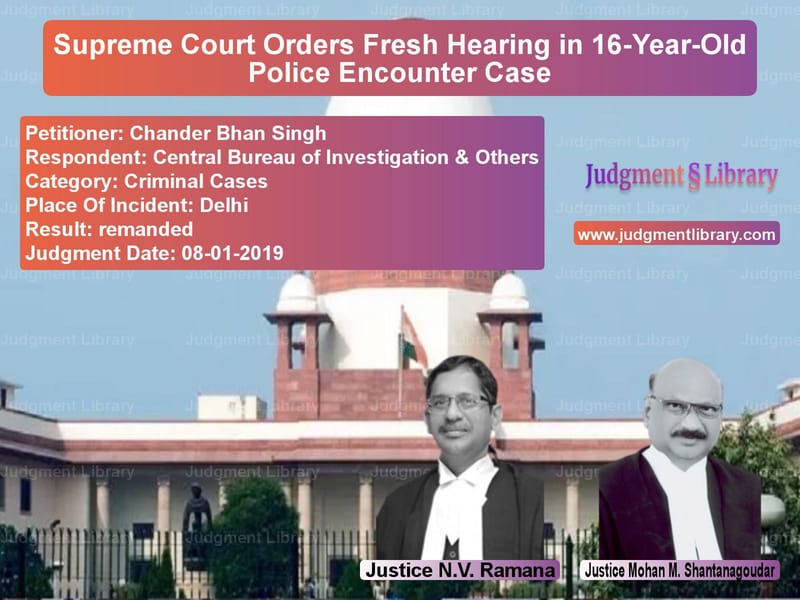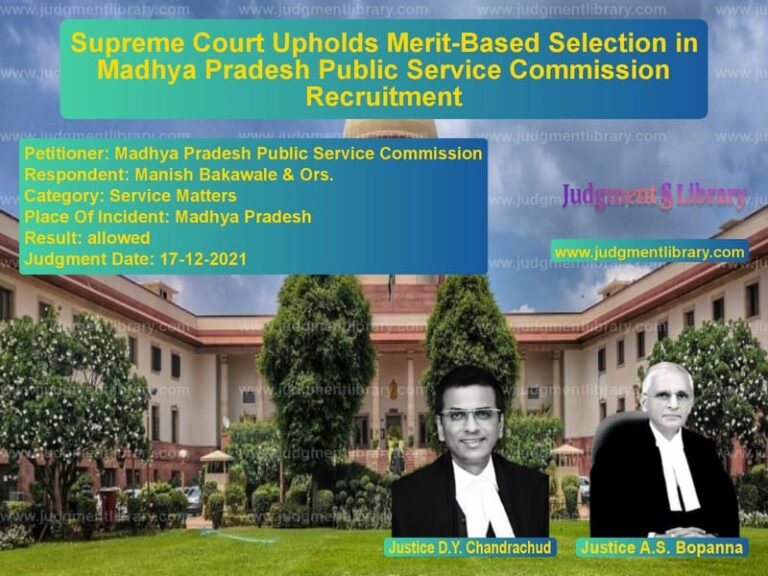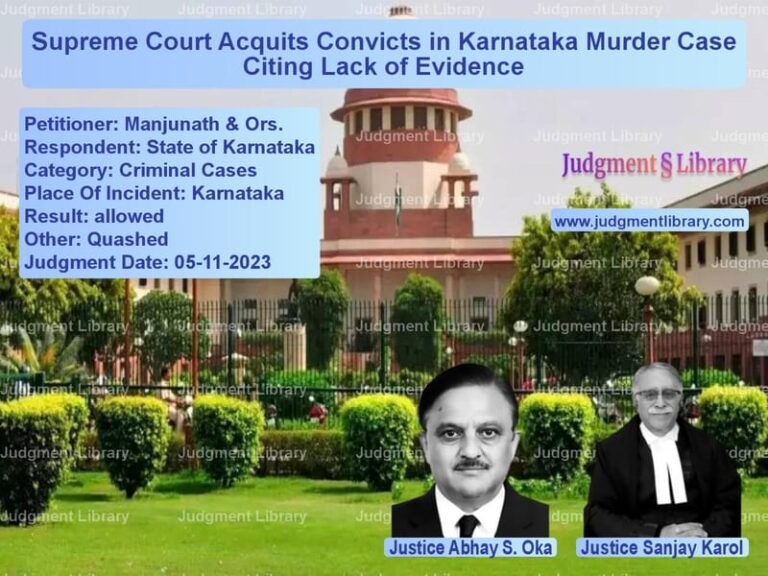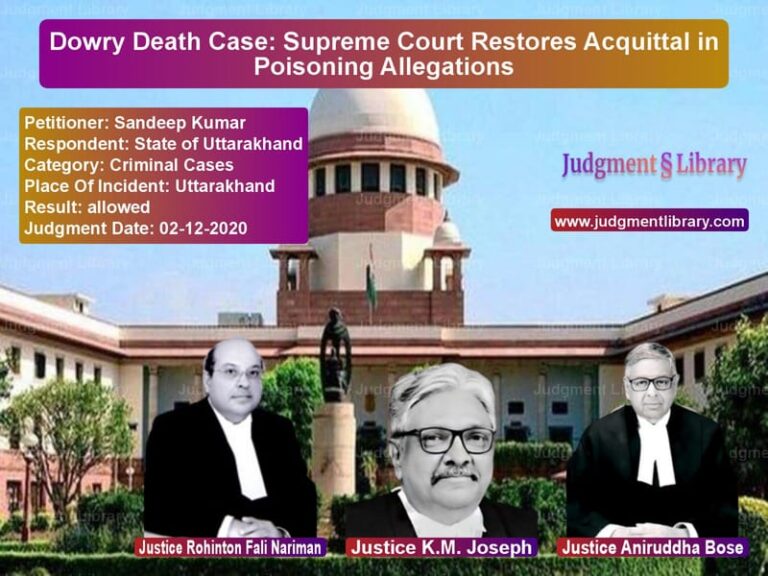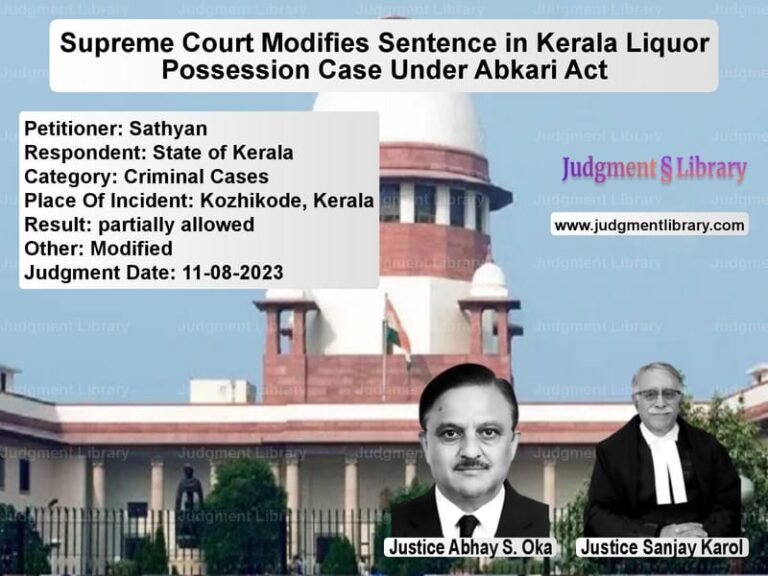Supreme Court Orders Fresh Hearing in 16-Year-Old Police Encounter Case
The Supreme Court of India, in the case of Chander Bhan Singh vs. Central Bureau of Investigation & Others, addressed a long-pending case concerning an alleged police encounter resulting in the death of the appellant’s son. The Court directed the Delhi High Court to hear the matter afresh, setting aside the previous order that dismissed the revision petition on procedural grounds.
Background of the Case
On January 11, 2002, Chander Bhan Singh filed a criminal writ petition in the Delhi High Court alleging that his son had been wrongfully killed by the police in a staged encounter. The High Court, vide order dated January 30, 2002, directed the Central Bureau of Investigation (CBI) to investigate the matter. The CBI subsequently registered an FIR under Sections 218, 302, 201 read with Section 34 of the Indian Penal Code (IPC).
Following an investigation, the CBI filed a closure report, citing a lack of sanction for prosecution from the Lieutenant Governor of Delhi. However, the Chief Metropolitan Magistrate (CMM) rejected the closure report on August 6, 2008, and took cognizance against 13 police officers. The case was then committed to the Sessions Court.
Legal Proceedings and Challenges
- One of the accused police officers filed a criminal revision petition challenging the CMM’s order. The Additional Sessions Judge dismissed the revision petition on May 14, 2009.
- The accused, along with the Government of NCT Delhi, then moved the Delhi High Court, filing petitions under Section 482 CrPC. The High Court allowed these petitions on September 22, 2011, directing the Magistrate to reconsider the closure report.
- The appellant challenged the High Court’s decision before the Supreme Court, but his plea was dismissed on December 12, 2011, with a directive to the Magistrate to expedite the matter.
- On May 24, 2012, after a fresh hearing, the Magistrate accepted the closure report. The appellant then moved a criminal revision petition before the Delhi High Court.
- After more than two years, the High Court dismissed the revision petition on October 28, 2014, advising the appellant to approach the Sessions Judge instead.
Arguments by the Petitioner (Chander Bhan Singh)
The appellant argued:
- The High Court erred in dismissing his revision petition after a prolonged delay without considering the merits of the case.
- The police officers involved had tampered with evidence, warranting a thorough judicial review.
- The acceptance of the closure report without adequate scrutiny was a miscarriage of justice.
Arguments by the Respondent (CBI & Others)
The respondents contended:
- The CBI’s closure report was based on a thorough investigation.
- The High Court’s decision to direct the appellant to the Sessions Court was legally sound.
- There was no special circumstance to warrant bypassing the Sessions Court.
Supreme Court’s Observations
The Supreme Court, comprising Justices N.V. Ramana and Mohan M. Shantanagoudar, made the following observations:
“Considering that this case has been pending for over 16 years, and given our constitutional mandate for speedy justice, it would not be appropriate to delve into the legal intricacies of concurrent revisionary jurisdiction at this stage.”
The Court emphasized that the High Court should not have dismissed the revision petition purely on procedural grounds without examining the substantive issues.
Final Judgment
The Supreme Court ruled:
“The High Court’s order dated 28.10.2014 is set aside. The matter is restored before the High Court for reconsideration. The High Court is requested to hear the case on merits and pass an appropriate order without further delay.”
The Court further clarified that it had not expressed any opinion on the merits of the case and that the High Court must independently assess all aspects of the matter.
Significance of the Judgment
- Reaffirmation of Access to Justice: The ruling ensures that procedural technicalities do not prevent a fair hearing of a serious criminal complaint.
- Judicial Oversight on Encounter Cases: The decision reinforces the need for stringent judicial scrutiny in cases involving allegations of extrajudicial killings.
- Clarification on Revisional Jurisdiction: The judgment leaves open the broader legal question of whether a High Court can refuse to entertain a revision petition in favor of the Sessions Court.
Conclusion
The Supreme Court’s ruling restores the appellant’s opportunity for a fair hearing, ensuring that procedural barriers do not obstruct the pursuit of justice. By directing the High Court to reassess the case on merits, the judgment underscores the judiciary’s commitment to accountability and due process.
Petitioner Name: Chander Bhan Singh.Respondent Name: Central Bureau of Investigation & Others.Judgment By: Justice N.V. Ramana, Justice Mohan M. Shantanagoudar.Place Of Incident: Delhi.Judgment Date: 08-01-2019.
Don’t miss out on the full details! Download the complete judgment in PDF format below and gain valuable insights instantly!
Download Judgment: Chander Bhan Singh vs Central Bureau of In Supreme Court of India Judgment Dated 08-01-2019.pdf
Direct Downlaod Judgment: Direct downlaod this Judgment
See all petitions in Custodial Deaths and Police Misconduct
See all petitions in Bail and Anticipatory Bail
See all petitions in Judgment by N.V. Ramana
See all petitions in Judgment by Mohan M. Shantanagoudar
See all petitions in Remanded
See all petitions in supreme court of India judgments January 2019
See all petitions in 2019 judgments
See all posts in Criminal Cases Category
See all allowed petitions in Criminal Cases Category
See all Dismissed petitions in Criminal Cases Category
See all partially allowed petitions in Criminal Cases Category

